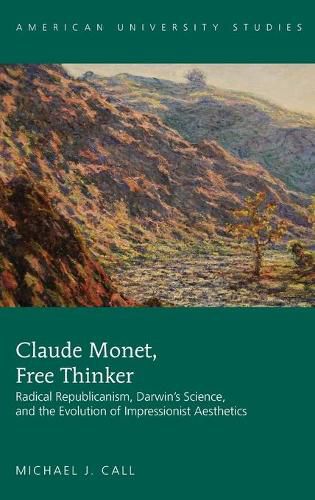Claude Monet, Free Thinker: Radical Republicanism, Darwin's Science, and the Evolution of Impressionist Aesthetics
Michael J. Call

Claude Monet, Free Thinker: Radical Republicanism, Darwin’s Science, and the Evolution of Impressionist Aesthetics
Michael J. Call
This title is printed to order. This book may have been self-published. If so, we cannot guarantee the quality of the content. In the main most books will have gone through the editing process however some may not. We therefore suggest that you be aware of this before ordering this book. If in doubt check either the author or publisher’s details as we are unable to accept any returns unless they are faulty. Please contact us if you have any questions.
This revolutionary interdisciplinary study argues that Monet’s artistic practices and choices were the direct result of his political stance as a nineteenth-century libre penseur, a position characterized by radical republicanism, a progressive social agenda, and fierce anticlericalism. His efforts to create a style reflecting his personal political code led him to produce paintings proclaimed by like-minded free thinkers as a science being constantly perfected (Gustave Geffroy), that is, emphasizing only observable phenomena in the immediate present through scrupulous, insistent on-site observation, capturing the raw data of sensations and sensory experience, and purporting to record a world free of embedded meaning. Darwin’s world similarly comes with no prepackaged reassurance of humankind’s privileged place in it; it is instead a space in which all varieties of organisms and species compete for limited resources in a struggle for survival. The Darwinian model of nature appears to have influenced Monet’s artistic production increasingly as his style evolved over several decades. In opposition to post-Renaissance art that privileged the human presence in both representation and the viewing act, Monet’s later paintings create a sense of virtual and visual equality among all observable phenomena. The human - and the viewer, by extension - is thus represented as neither separate from nature as a disengaged observer nor superior to it but rather co-equal with all other organic life forms surrounding it. This approach, while echoing Darwin’s admiration of nature and its laws, also reminds humankind of its own fragility and the hard choices it must make to avoid extinction.
This item is not currently in-stock. It can be ordered online and is expected to ship in 7-14 days
Our stock data is updated periodically, and availability may change throughout the day for in-demand items. Please call the relevant shop for the most current stock information. Prices are subject to change without notice.
Sign in or become a Readings Member to add this title to a wishlist.


